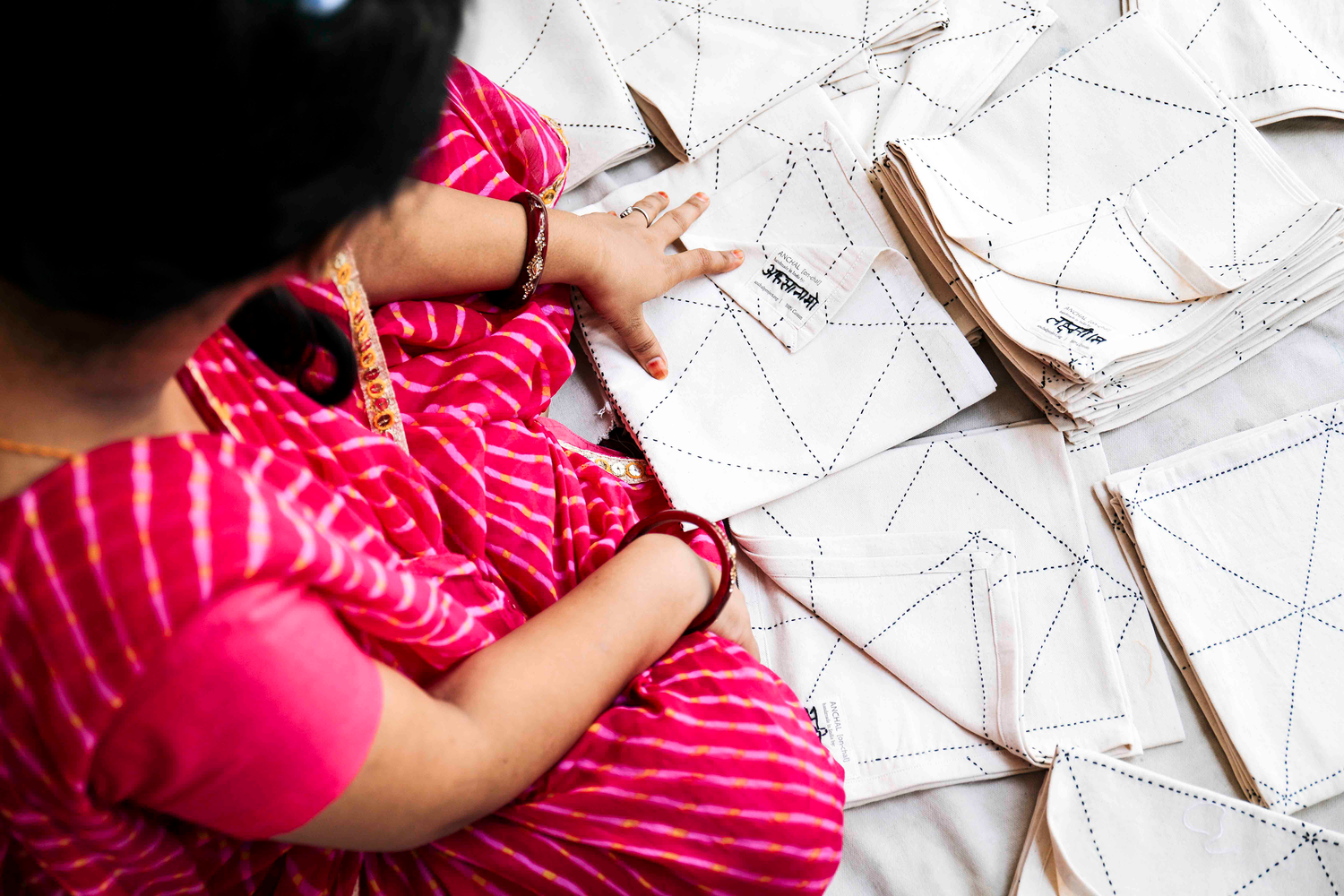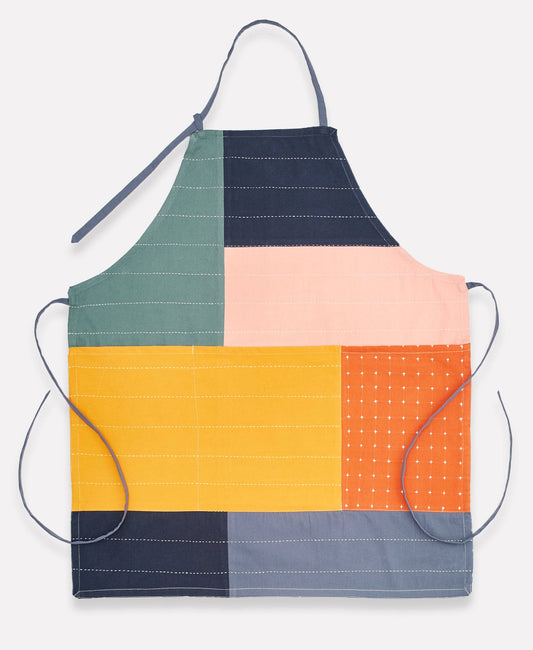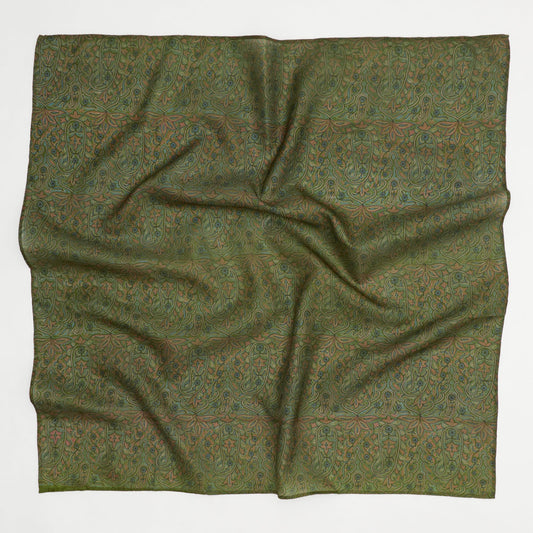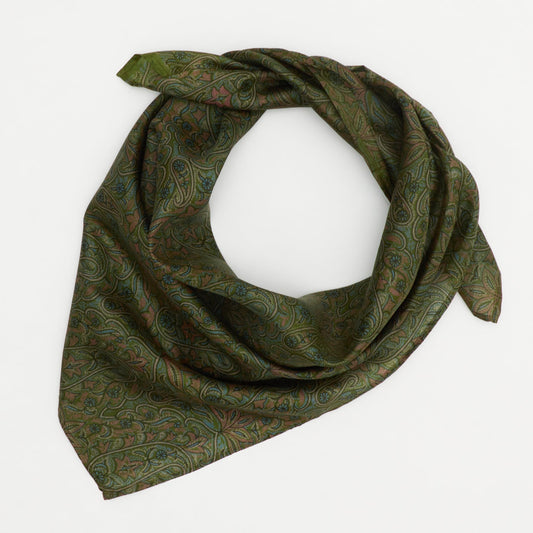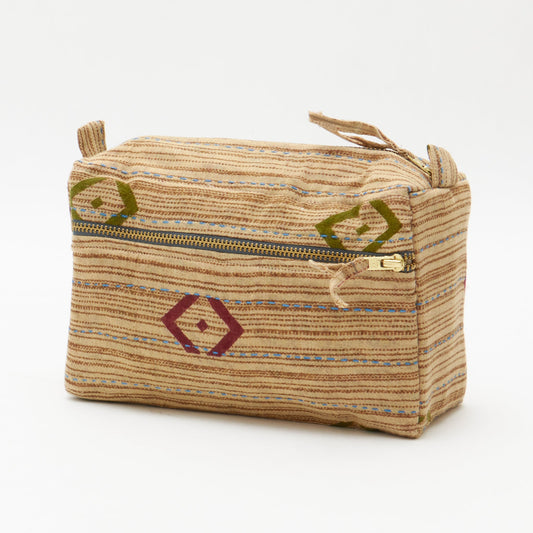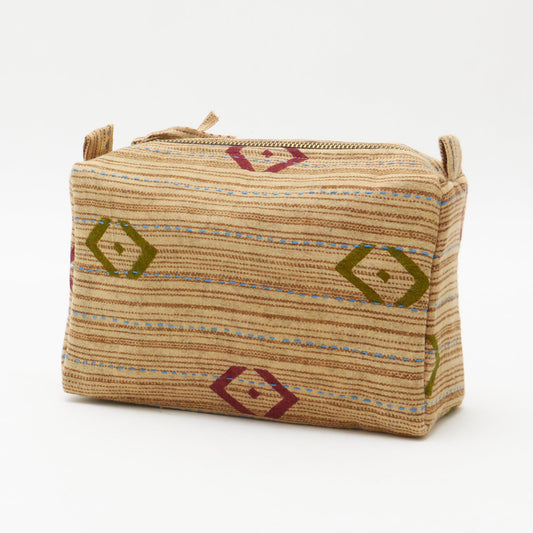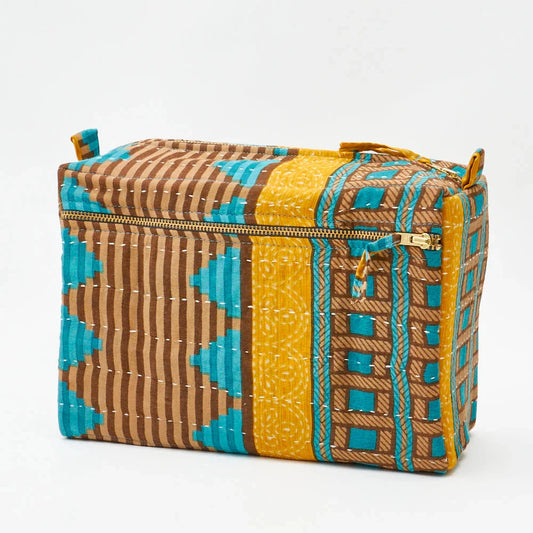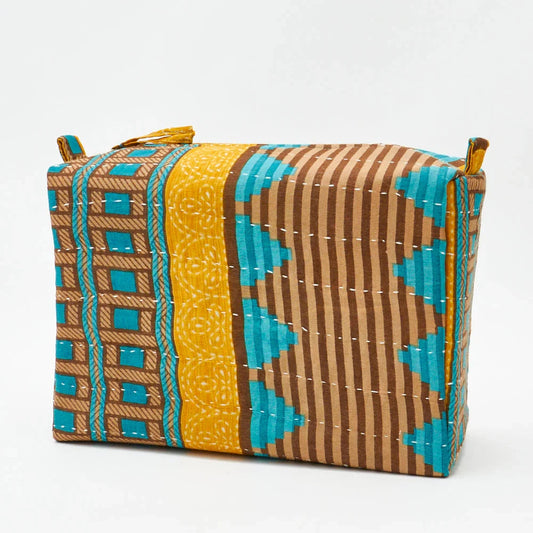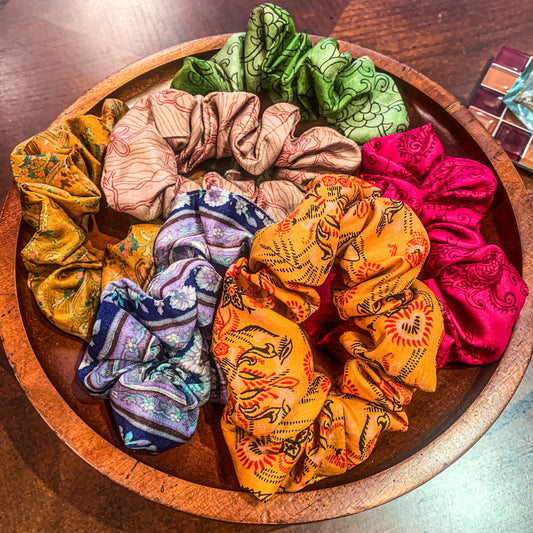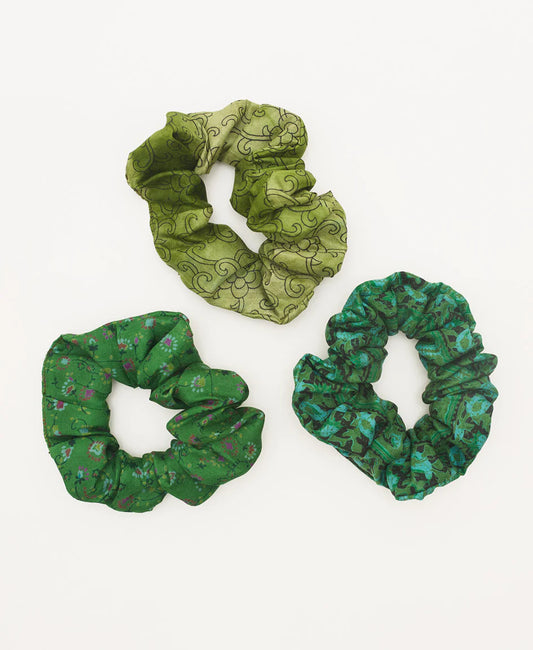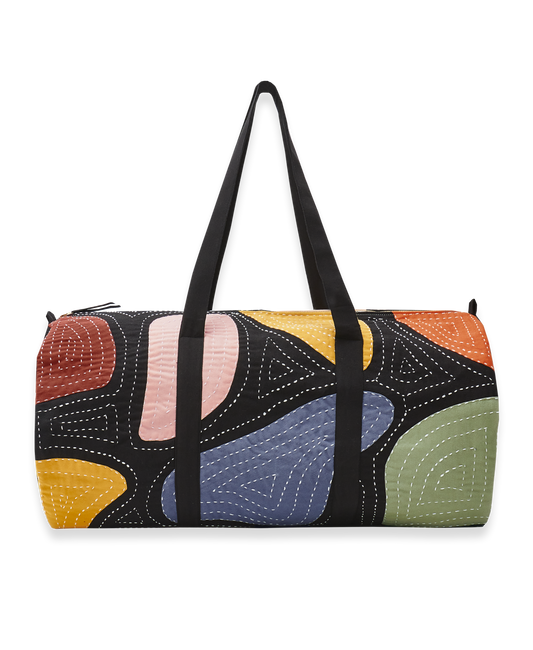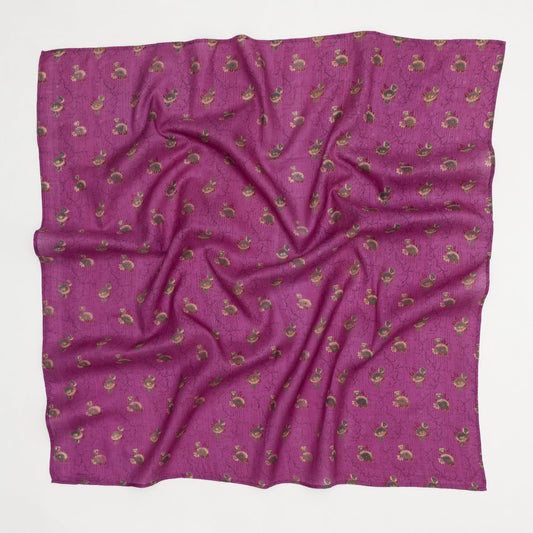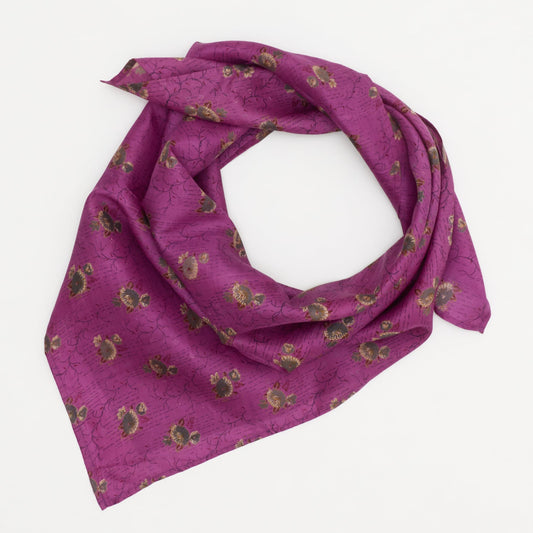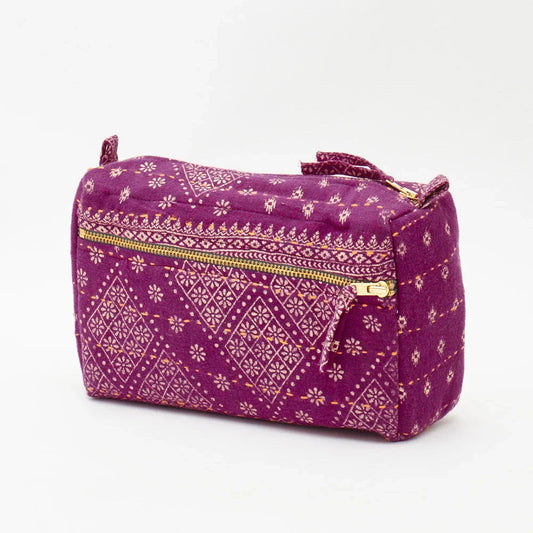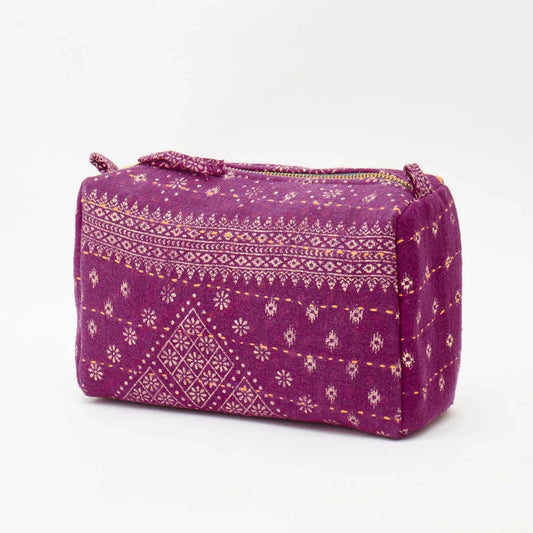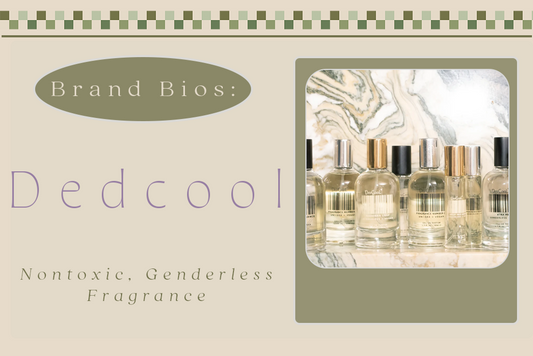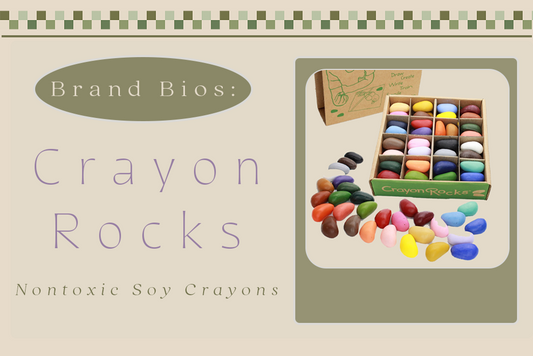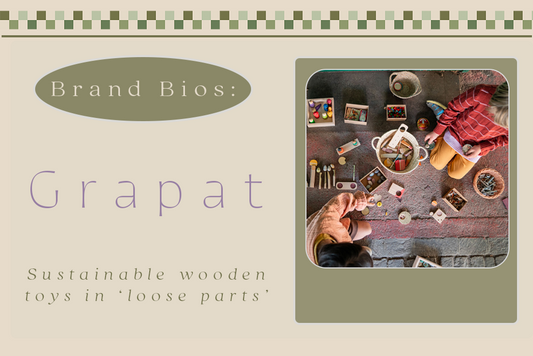The Anchal Project is a nonprofit organization that works with women in India to produce a line of hand-stitched textiles that ranges from toiletry bags to stuffed animals to robes and the classic kantha quilt that started their journey.
We caught up with Elizabeth, part of Anchal's operations team here in the States, and she was kind enough to answer some questions for us about Anchal's processes & philosophies.
1. Tell us a little about Anchal’s process. I’ve always been interested in the design and production process, as well as how the two end up commingling. How does a product go from an idea to a design, to a fully fledged, tangible object?
Our design inspiration comes from everyday life. We find an idea that can spark at any moment.
Many of our designs are heavily influenced by architecture, vernacular imagery and the intimate world of Anchal artisans. Moments captured by photographs during design workshops or experiences traveling often become the genesis for larger collections.
Once we discover our direction for a collection or item, we begin sketching, sourcing, and prototyping. We receive a sample from India, work through any kinks and then approve for production. Once the pieces are finished in India, they make their way to our studio in Louisville to be quality checked and then made available to our customers.

3. How did Anchal end up finding and settling on its signature quilting motif?
Over the years, we started with one product: the quilt. Looking at it as a design challenge: what can artisans complete with their skills? At that point, it was limited to simple running stitches. We thought, what if we change the dimensions, what can we create?
Slowly we introduced new products and challenged our artisans with new techniques, designs and patterns. You wouldn’t know it, but the zipper was our biggest celebration. Once we mastered it, the door opened to creating a lot of other things.
4. How do you connect with the artisans you work with in India?
Anchal currently partners with Vatsalya, a Non Governmental Organization (NGO) in Ajmer, India. They see the need to provide entrepreneurial opportunities to the community. Anchal meets this need by providing seed funding, design training and access to markets.
In exchange, our partner recruits women and offers a community of support, health programs, counseling and local leadership that builds trust. Together, we offer a unique program unmatched in its ability to create life-changing opportunities.

5. Being a non-profit makes Anchal an entirely different type of company in that it puts its mission of bringing ethical, sustainable employment first. The profit from the proceeds is more of a means to accomplishing this mission than the reason for being. What inspired Anchal to choose this route?
Anchal began as a class project with the prompt: design a product with textiles that would benefit a community in need. Colleen and Maggie have not strayed from the origin of Anchal’s mission & purpose.
As a 501(c)3 non-profit, when you purchase a product 100% goes towards investing in Anchal's mission. In addition to women's economic stability, portions of each purchase go towards educational workshops and health benefits for our artisans, as well as program expansion.
5b) How does being a non-profit change the way Anchal operations in comparison to your average fashion/textile brand?
The artisans and our Louisville Team have been on this journey together with a full appreciation for each other and with full transparency, which is rarely the arrangement between buyer and maker in the textile industry.
Anchal did not begin by wanting to produce textiles and finding people to make it. We started with a call to end women’s exploitation and support women’s empowerment.
6. How do Anchal’s philosophies about sustainability (in both an environmental and ethical employment sense) influence the way the organization is run?
Anchal was founded with the belief that design can change lives. This actualizes itself in many forms, whether it is our job training program, the actual textiles, or conceptually through our global mission.
Our programs demonstrate that when we systematically address employment inequality, we can reduce the number of women reliant on commercial sex work and eliminate the stigma that women and girls face around the world.
95% of Anchal artisans have left the commercial sex trade or dramatically reduced their clients. Every artisan has her own personal bank account. And 100% of artisans are investing in their children’s education, thereby breaking the cycle of exploitation.
In addition to ethical production and sustainable employment, Anchal carefully sources recycled material, organic fibers, and natural dyes to handcraft our products. Each of our one-of-a-kind quilts is made using up-cycled saris. We believe by being thoughtful and innovative, we can begin to offset the damage to our planet.
7. What are some of the short and long term effects Anchal has had on the life of their artisans?
Our holistic program is designed to address the diverse needs of each woman and equip them with the tools to sustain employment as an Anchal artisan and beyond.
By offering alternatives to dangerous and exploitative work, we help women rediscover their dignity, independence and creativity in a financially rewarding way. Our programs offer women design and skills training, full-time employment, educational workshops, health services, a supportive community, and access to an international marketplace.
We are committed to ensuring that our program is creating positive change. Our impact is evident in each artisan’s personal growth, which we measure annually. Ferosa purchased a plot of land and has ideas for a farm, Renu bought her family a water filter to ensure safe drinking water, Seema purchased purple tile for her kitchen and Laxmi sent her daughter to college.

8. Since Anchal’s beginning, what has changed about the company over time as it has grown and you’ve learned more?
We started very humbly with only $400 in the bank and the training of eight artisans. The beginning was supported by very grassroots efforts and wonderful generosity from our local community.
To date, we have impacted over 620 women in India and currently employ 181 artisans. As a social enterprise, we are continuously working to drive impact from product sales versus donations alone. With each year, we are coming closer and closer to that goal. We are so grateful for the growth we’ve experienced since our start in 2010 and for all the folks who have supported us along the way.
9. How large is the team currently? (From what I understand you’re based in Louisville and India?)
At this point (end of 2022), we’re pretty structured. We have a team of 7 in Louisville, and within the NGO we have our Director, Manager and 19 Project Assistants who handle the coordination of the production process. They distribute the work to all 181 artisans, while we connect with the Director once a week.
10. I’m sure the sustainable fashion/textile world is rapidly evolving, thanks largely to brands like Anchal. Can you think of anything happening right now in the sustainable textile world that you’re excited to watch develop?
We are consistently impressed and inspired by our peers in the fashion/home textiles space season after season. From developments in sustainability, technology, and ethical production, there is so much to learn! We’re excited to grow with the industry while remaining committed to the needs and interests of our customers, artisans, and mission.



